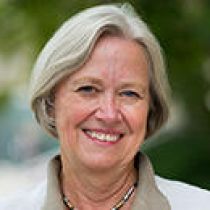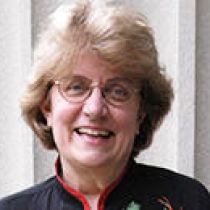Helen Dean King Award
Given each year, the Helen Dean King Award brings an inspiring and prestigious scholar to Philadelphia. Their expert lecture gives insights into the latest advancements in their respective field and creates an opportunity to talk about the persistent challenges with increasing participation of women in the science.
The award is named after Dr. Helen Dean King (1869– 1955), a well-respected geneticist and the first woman hired as a scientist at Wistar. She was one of only a handful of women researchers in the nation who worked in the male-dominated field at the turn of the 20th century. This award is given in testament of Dr. King for her contribution to biomedical science and paving the way for more women to create their own indelible scientific legacy.
Past Award Recipients

Katalin Karikó, Ph.D.
Professor of the University of Szeged in Hungary
Adjunct Professor of Neurosurgery at the Perelman School of Medicine, University of Pennsylvania

Cori Bargmann, Ph.D.
Torsten N. Wiesel Professor, Head of the Lulu and Anthony Wang Laboratory of Neural Circuits and Behavior

Carolyn Bertozzi, Ph.D.
Howard Hughes Medical Institute Investigator, Baker Family Director of Stanford ChEM-H, Anne T. and Robert M. Bass Professor in the School of Humanities and Sciences and Professor, by courtesy, of Chemical and Systems Biology and of Radiology

Akiko Iwasaki, Ph.D.
Howard Hughes Medical Institute Investigator, Waldemar Von Zedtwitz Professor in the Department of Immunobiology, and Professor in the Department of Molecular, Cellular, and Developmental Biology

Bonnie L. Bassler, Ph.D.
Howard Hughes Medical Institute Investigator, Squibb Professor in Molecular Biology and Chair of Molecular Biology

Mary-Claire King, Ph.D.
American Cancer Society Professor of Genome Sciences and Medicine

Shirley M. Tilghman, Ph.D.
President Emerita

Nancy H. Hopkins, Ph.D.
The Amgen, Inc. Professor of Biology Emerita
Helen Dean King, Ph.D., was a geneticist and one of a small handful of women scientists working in the largely male-dominated field of science at the turn of the 20th century. She was Wistar’s first female scientist, employed from 1909 until her retirement in 1950. At the time, she was the only woman in America to be hired as a full professor in research. Dr. King published more than 80 research papers and belonged to many scientific societies. In 1932, Dr. King was awarded the Ellen Richards Research Prize, once known as the “Women’s Nobel.”
